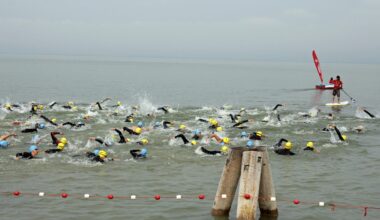Using Functional Training to Develop Better Posture and Movement Patterns in Athletes
Functional training has gained significant traction in the athletic world, emphasizing the importance of developing both posture and movement patterns. Unlike traditional training methods that often focus on isolated muscle groups, functional training integrates various muscle groups to mimic real-life activities. This holistic approach fosters better functional capabilities, making athletes more adaptable and resilient during competition. Improved posture is critical for athletes, as it enhances their ability to engage in their respective sports effectively. Athletes often seek to improve their performance with exercises targeting these areas, leading to better results overall. By incorporating exercises tailored to specific movements, athletes can enhance their proprioception and kinesthetic awareness. This is essential for maintaining balance during dynamic activities. Functional training fosters a full range of motion, which can help prevent injuries and maintain joint health. Consequently, a well-designed program can lead to greater overall athletic efficiency, ensuring resilience under pressure. Athletes often report improved agility and strength from functional training exercises focusing on posture and movement patterns. This article explores the primary components and benefits of functional training and their relevance to athletes seeking enhanced performance.
One of the key benefits of functional training is its ability to improve core stability. A robust core enables athletes to maintain better balance and enhances their overall athletic performance. Functional training emphasizes exercises that enhance core strength, such as planks, kettlebell swings, and medicine ball throws. These compound movements engage multiple muscle groups, providing stability, mobility, and strength. By developing core strength, athletes experience increased power output in their functional movements, which translates to better performance on the field or court. Improved core stability aids in maintaining proper posture during sports-specific activities, reducing the risk of injury during critical performance moments. Additionally, enhanced core strength helps athletes recover more rapidly from strenuous activities, as it promotes better blood flow and oxygen delivery essential for muscle recovery. The advantages of functional training also extend to enhancing motion efficiency during games. Athletes become more equipped to execute rapid direction changes without compromising their form. Practicing these functional exercises regularly helps to engrain movement patterns that become second nature during athletic events. In summary, developing core stability through functional training is crucial for athletes aiming for unparalleled performance in their respective sports.
Another significant advantage of functional training is its positive impact on joint health and flexibility. By incorporating a variety of dynamic movements, athletes work on improving muscle elasticity, which supports joint stability and mobility. Enhanced flexibility allows athletes to achieve deeper ranges of motion during physical activities, promoting optimal performance in their sports. Exercises such as lunges, squats, and rotational movements target key muscle groups while encouraging overall body flexibility. Furthermore, functional training strategies support the body’s natural biomechanics, helping to prevent injury by ensuring the proper alignment of the limbs and joints. With improved flexibility and joint health, athletes can execute powerful movements without straining their muscles or joints unnecessarily. Moreover, a flexible athlete can respond more adeptly to unforeseen movements during games or practices, giving them an edge in performance. Functional training also raises awareness of movement quality, urging athletes to prioritize proper form over quantity in their workouts. This increased focus on technique helps athletes understand how their bodies should function, leading to better posture throughout their athletic endeavors. Ultimately, improved joint health and flexibility from functional training translates to enhanced performance and longevity in sports.
Incorporating Functional Training into Regular Workouts
When implementing functional training into a regular workout regimen, athletes should consider the importance of specificity. It’s essential to tailor exercise selections to match the demands of their respective sports, ensuring maximal benefits. For instance, a soccer player may prioritize exercises that enhance lateral movements and explosiveness, while a swimmer might focus on shoulder stability and core strength. Adding functional movements such as agility drills, balance exercises, and plyometrics will directly enhance performance on the field or in the pool. Incorporating equipment like stability balls, resistance bands, and balance boards can further engage core muscles. Engaging multiple angles and planes of motion will build strength as athletes train for dynamic scenarios they face during competitions. In addition, it’s crucial to maintain progression within the training plan. This can be accomplished by systematically increasing intensity and complexity as athletes become more proficient. Monitoring improvements through objective measures is also vital for keeping motivation high. Ultimately, the aim is to create a functional training program that aligns with athletes’ goals, fostering continual improvement. With time and dedication, athletes will witness remarkable changes in posture and functional movement patterns that enhance performance.
The role of a qualified coach cannot be overlooked when integrating functional training into an athlete’s routine. A knowledgeable coach can help design a personalized program based on individual strengths and weaknesses. They provide valuable feedback on exercise technique, ensuring movements are performed correctly to maximize effectiveness. Additionally, coaches can consistently assess progress, adjusting training methodologies to match an athlete’s evolving needs. Having expert guidance ensures athletes engage in safe, effective functional training practices that promote optimal posture and movement patterns. One effective approach is including periodized training cycles, where the focus rotates periodically among strength, endurance, and agility. This strategy can prevent overtraining and burnout while keeping athletes engaged. Regular assessments enable coaches to identify areas for improvement based on performance metrics, refining their plans as needed. Coaching not only adds professionalism to functional training sessions but also serves to motivate athletes to push their limits respectfully. Alongside coach support, athletes’ commitment to their performance goals is equally critical. Blending individual dedication with expert guidance builds resilience, enhances movement patterns, and develops a strong foundation for better athletic performance. The combination of informed coaching and dedicated training leads to exceptional outcomes.
The Psychological Aspects of Functional Training
In addition to the physical advantages of functional training, mental benefits also play a significant role. As athletes engage in movement-focused training, they often experience improved mental resilience and adaptability. This psychological growth stems from facing and overcoming challenges during functional exercises, which can translate to greater confidence in their sports performance. Practicing functional movements emphasizes the connection between mind and body, helping athletes cultivate heightened awareness of their physical condition. This awareness can foster better focus and concentration during competitions, allowing for more effective execution of required skills. Furthermore, functional training can help relieve stress related to performance expectations. Athletes often experience pressure to excel, and incorporating a varied training regimen can alleviate these stressors, enhancing overall enjoyment of the sport. This focus on diverse movements can lead to a more sustainable athletic career, promoting lifelong engagement in physical activity. Athletes find intrinsic motivation in realizing their progress, reinforcing their commitment to continued improvement. Ultimately, embracing functional training not only catalyzes physical performance enhancements but also fosters a resilient and confident mindset needed to excel under pressure.
The integration of technology into functional training has revolutionized how athletes approach performance enhancement. Wearable devices, such as heart rate monitors and motion tracking systems, allow athletes to gather data about their training. This technology provides valuable insights into metrics like heart rate variability, movement efficiency, and overall workload. By analyzing this information, athletes can tailor their workouts to match their specific goals. Progress tracking through technology creates an opportunity for continuous improvement, establishing a data-driven approach to training. Additionally, video analysis software can highlight movement patterns that promote better posture and biomechanics during exercises. Completed sessions help athletes identify areas needing improvement, enhancing their understanding of functional movements. Mobile applications also deepen athlete engagement, offering tools to record workouts while providing instructional videos that reinforce proper techniques. Utilizing technology not only enhances accountability but also sparks excitement within training sessions. This modern approach to functional training can keep athletes motivated and engaged over the long term. As athletes leverage technology, they discover new ways to improve posture and movement patterns, translating technical feedback into practical performance gains. The integration of technology ultimately enriches the functional training experience, driving success.
In conclusion, functional training emerges as an invaluable tool for athletes aiming to enhance their posture and movement patterns. Through its focus on total-body conditioning and multi-dimensional movements, functional training fosters remarkable improvements in athletic performance. Athletes targeting core stability, joint health, and flexibility experience significant benefits that lead to effective outcomes in their respective sports. The combination of smart programming, dedicated coaching, and athlete commitment creates a powerful methodology for growth and development. Furthermore, facts show that integrating psychological components strengthens mental resilience, allowing athletes to thrive under performance pressure. As technology continues to shape the future of training, athletes can capitalize on innovations that help refine their skills and optimize results. Functional training empowers athletes to reach their fullest potential by ensuring that training is comprehensive, sustainable, and effective. By focusing on posture and movement patterns, athletes cultivate a robust foundation critically necessary for lasting success. As functional training becomes increasingly mainstream, it bears the potential to change the athletic landscape positively. Embracing its principles ultimately equips athletes with effective tools to excel in both competitions and everyday life, where movement quality matters most.


